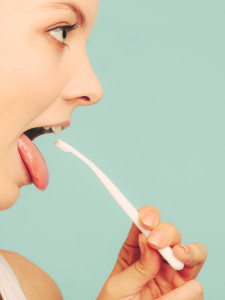
 For as long as most of us can remember, we’ve been told to brush our teeth every day, at least twice, and to floss at least once a day. As the importance and range of oral health becomes more and more clear, the necessity of a clean tongue takes on new importance as well. For some people, this merely means a few extra strokes of the toothbrush while brushing their teeth. For others, this means nothing, and they disregard the importance of cleaning the tongue altogether.
For as long as most of us can remember, we’ve been told to brush our teeth every day, at least twice, and to floss at least once a day. As the importance and range of oral health becomes more and more clear, the necessity of a clean tongue takes on new importance as well. For some people, this merely means a few extra strokes of the toothbrush while brushing their teeth. For others, this means nothing, and they disregard the importance of cleaning the tongue altogether.
As children, much of our parents’ advice and instruction did not make a lot of sense, mostly because many lessons require a certain degree of life experience to understand. Likewise, many people understand that daily oral hygiene is important, but only because they’ve been told so, and not necessarily because they understand why.
Every day, your mouth plays host to over 15 billion different bacteria. Each microbe has its own purpose and function, and most of those found in your mouth are harmless. Some, however, are quite dangerous, and can lead to serious oral and overall health issues. As living organisms, bacteria process the nutrients in your meal and produce waste products that are dangerous to your teeth and oral tissues.
Cavity-causing bacteria excrete acids, for instance. The acids eat away at your tooth enamel until it can no longer protect your teeth, then bacteria enter and infect the interior of your tooth structure. By brushing and flossing daily, you can help control the bacterial population and limit the damage they can cause in large numbers.
Oral bacteria are also responsible for embarrassing conditions such as bad breath. Some strains excrete volatile sulfur compounds after consuming nutrients. These compounds are similar to the smell of rotten eggs, and sometimes worse. About 85% of halitosis cases originate from the tongue, since the sulfur-emitting bacteria tend to congregate on its surface. Studies show that using a tongue scraper can reduce the amount of sulfur produced by 75%, compared to 45% for a toothbrush.